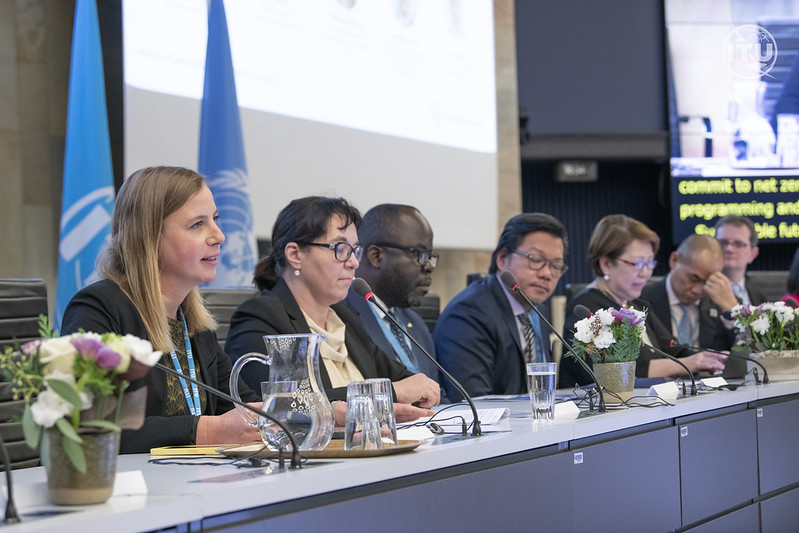IFLA joins Partner2Connect Annual Meeting, pledges work on geolocation and digital inclusion practices
13 December 2023
IFLA was honoured to take to the stage at the Partner2Connect Annual Meeting 2023, and present two pledges connected to the initiative’s overall goal to bring meaningful internet connectivity within reach of everyone.

The Partner2Connect initiative was launched in 2021, at a time where the COVID-19 pandemic and resulting lock-downs were showing the power of internet connectivity to allow people to continue with their lives. Those on the wrong side of the digital divide faced multiple challenges in learning, earning, staying in touch and more.
Alongside many other activities designed to reach universal connectivity, Partner2Connect places a special emphasis on bringing together actors – including from different sectors – in order to develop concrete programmes that bring the internet to all.
The Annual Meeting is then an opportunity to highlight what has been achieved, as well as to welcome new pledges and encourage new cooperation.
It was therefore very welcome for IFLA to be able to join panellists at the meeting, in order to to talk both about the role of libraries in supporting efforts to bring meaningful internet access to all. The combination of a non-commercial space, dedicated staff, and curated collections, added to connectivity, created unique possibilities.
IFLA’s first pledge focused on bringing together and sharing information about the geolocation of libraries in order to support efforts such as the GIGA Initiative, which already supports investment in connecting schools. The second proposed to develop a handbook, building on good examples of digital inclusion initiatives by libraries, in order both to inspire colleagues around the world, and demonstrate the value of making libraries part of wider connectivity strategies.
We look forward to delivering on these commitments, as well as to building partnerships, from the global to the local levels, in order to ensure that everyone can get the best from the internet.
IFLA’s intervention is below:
I am here representing IFLA, which in turn represents a pre-existing network of almost 3M institutions of all shapes and sizes worldwide, and nearly half a million public and community ones. Where we have data, so on a conservative guess, that’s one public or community for every 16K people.
This network has centuries of experience as the community information hub, built on a logic not of imposing solutions top down, but building them bottom-up, and increasingly – thanks in large part to the internet – libraries are focusing on how to turn information access into real-world change.
So what do libraries bring to partnerships?
Firstly, a unique, non-commercial, familiar space – a place that does not judge, a place where you are not labelled as a job-seeker, a person experiencing homelessness, as having a medical condition, or even someone on the wrong side of the digital divide when you walk through the door
Secondly, staff with a mission to help people turn information into change, as well as key insights into what people and communities need. They can also be trained and supported to deliver more systemic training and confidence-building, or to form partnerships with others in order to combine strengths
Thirdly, collections – curated resources, often those not available for free on the open internet, built with the needs of the community in mind. And more and more, we’re seeing libraries themselves becoming spaces for creation, filling gaps, producing information that meets community needs.
When you combine these with connectivity, you have a serious potential to make things happen at scale.
And so I’m happy that we are able to make two pledges, to help realise this potential.
Firstly, we will invest in gathering and sharing data on the geolocation of libraries, in alignment with the work of the Giga Initiative. We know that libraries don’t just complement schools in supporting students, but they are a key portal and platform for adult learning and education. We want to provide data for at least two countries on each of three continents, and obviously hope for more.
And secondly, we will bring together examples of how libraries have been able to turn connectivity into meaningful digital inclusion, in order to create a handbook. This will be a guide and inspiration not just for libraries themselves, but, we hope, for anyone else looking to mobilise all relevant actors to deliver digital inclusion, with the goal of ensuring that at leat 4 countries include.
We look forward to working with you.